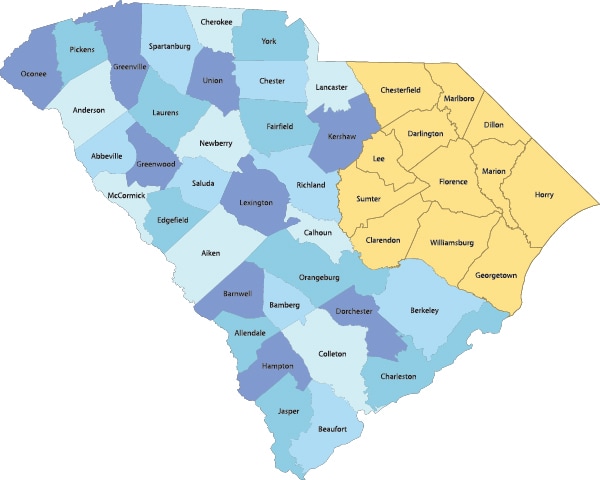At a glance
South Carolina leaders used cancer registry data to help more people get health care.
Cancer rates are high, especially in the Pee Dee region

South Carolina has a high rate of cancer deaths. More South Carolinians die of cancer than heart disease. Breast and cervical cancer are some of the most common and deadly cancers in the state, especially among Black women. To help lower these rates, state leaders used cancer registry data to help more people get the health care they need.
The South Carolina Central Cancer Registry collects information about all new cases of cancer in the state. It also gets information on cancer deaths from the state's Department of Health and Environmental Control. Registry data showed that people in the Pee Dee region had the highest rates of getting and dying from breast and cervical cancer. The Pee Dee region is a rural area made up of 12 counties in the northeastern corner of South Carolina. In that area, Black women are more likely to get or die from breast or cervical cancer than White women.
New initiative helps women get screened for cancer
Leaders in South Carolina's breast and cervical cancer early detection program, called the Best Chance Network, made a plan to help women in the Pee Dee region. They developed the Can Screen Initiative to increase screening for breast and cervical cancer. Leaders of the Best Chance Network offered seven training sessions throughout the state. Trainers shared registry data and encouraged doctors to use it to plan screening programs.
In large federally qualified health centers, the Best Chance Network provided Lean Six Sigma training. The training aims to increase teamwork and help their staff improve their screening processes. Best Chance Network staff also showed the health centers how they could use their computer system to increase screening. They explained that doctors should talk to their patients about getting screened for cancer and make a note in the computer that they did so. Doctors should also make sure their patients were getting screened as recommended and refer them to other doctors for treatment if needed.
Community partners pitch in
The state's comprehensive cancer control program, called the South Carolina Cancer Alliance, provided resources and coordinated staffing to support the screening efforts. It also spread the word about these services through local media outlets. Community partners made educational presentations to recruit women to screening programs. These partners taught doctors, patients, community groups, and civic leaders about the importance of registry data by making them aware of the effect of screening in their area.
Successful results and a plan for the future
In the Pee Dee region, more doctors joined the state breast and cervical cancer screening program. So more doctors offer screening and follow-up services to women in the area. Before the Can Screen Initiative started, some counties in the region had no participating doctors. Now, each county now has at least one, with a total of 149 doctors in the 12-county region.
South Carolina will use lessons learned in the Pee Dee region to expand its efforts into the state's other three health regions. The Can Screen Initiative and registry data will help the state build a network of partners to improve cancer screening for women at high risk across the state.
